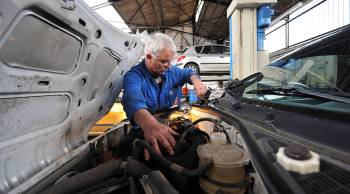TEXT OF STORY
SCOTT JAGOW: A couple of years ago, if I told you that oil would be $70 a barrel and that gas would be $3 a gallon, first of all, you might tell me I was off my rocker. Then, maybe you’d say — well, that would mean recession. But we’re not in a recession — quite the opposite right now. Chris Farrell is our economics correspondent. Hi Chris.
CHRIS FARRELL: How you doing?
SCOTT JAGOW: Alright. So what’s the deal?
CHRIS FARRELL: For one thing, despite the SUVs and all the conversations about how much energy we use, the US economy’s about 60 percent more efficient if you compare today to the 1960’s. Secondly, a lot of the higher price that we’re seeing reflects strong economic growth. I mean, think what’s happening with China, India, this economy has been growing. So I think that’s why we are not having a recession. And, you know, lastly, gasoline is actually a fairly small part of most people’s budget.
SCOTT JAGOW: But at some point, don’t these fuel prices have to squeeze some life out of the economy?
CHRIS FARRELL: What is so stunning about this particular time that we’re going through is there’s been very little pass-through. I mean, if you get on an airplane you can see there’s some sort of surcharge, I mean, there are some surcharges around but there’s been very little pass-through. Everyone was expecting much higher inflation numbers. And Robert Samuelson, he’s a columnist for Newsweek, and he made a really good point: We associate recessions with higher oil prices. And for good reason. Higher oil prices preceded five of our last recessions. But what was really going on there was inflation. And the Fed fighting inflation. What we have this time, is just the Fed has been hiking its benchmark interest rate but nothing like it did in the past and we don’t really have a whole lot of inflation.
SCOTT JAGOW: What does our experience right now with these high gas prices tell us, if anything, about the potential impact of a gasoline tax, say if we had a higher tax?
CHRIS FARRELL: Well if we went back two, three years ago and we’re talking about a 50 cent or a dollar gas tax, we’d be what? Probably around where we are right now. So obviously this economy’s a lot stronger, it can absorb a higher tax than we thought before. And I think for legislatures and for citizens that’s the real lesson. No one really likes paying $3 a gallon. But what we’re going to get from $3 a gallon is innovation, energy efficiency and less dependence on Middle Eastern oil. It sounds to me like not a bad deal.
SCOTT JAGOW: But I don’t hear a lot of people talking about a gas tax any more…
CHRIS FARRELL: Gas tax? No. It’s not on the horizon right now. But it’s a way of really increasing our efficiency and innovation. And that’s the real key. At $3 a gallon, there is innovation. There are garages out there in Los Angeles and in Minneapolis and New York where people are really trying to come up with a better mouse trap because of the high price of energy.
There’s a lot happening in the world. Through it all, Marketplace is here for you.
You rely on Marketplace to break down the world’s events and tell you how it affects you in a fact-based, approachable way. We rely on your financial support to keep making that possible.
Your donation today powers the independent journalism that you rely on. For just $5/month, you can help sustain Marketplace so we can keep reporting on the things that matter to you.


















